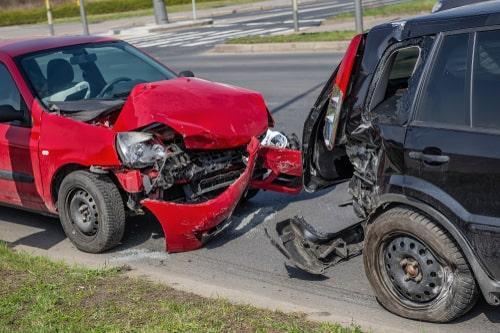What Are the Most Common Causes of a Rear-End Collision in Illinois?
 Chicago and its surrounding suburbs are notorious for heavy traffic. I-294 and I-90 are some of the most traveled tollways because of their convenience for getting into and out of the city, as well as from the south suburbs to the north shore. However, the roads are not as congested these days due to the governor’s stay-at-home order in response to the COVID-19 pandemic. Even with fewer vehicles out and about, there is still the risk of car accidents with injuries. Recent reports have shown an increase in traffic violations, such as speeding. In some cases, drivers may not obey the traffic laws since the roads are emptier than normal. According to the National Highway Traffic Safety Administration (NHTSA), almost one-third of all motor vehicle accidents are rear-end collisions.
Chicago and its surrounding suburbs are notorious for heavy traffic. I-294 and I-90 are some of the most traveled tollways because of their convenience for getting into and out of the city, as well as from the south suburbs to the north shore. However, the roads are not as congested these days due to the governor’s stay-at-home order in response to the COVID-19 pandemic. Even with fewer vehicles out and about, there is still the risk of car accidents with injuries. Recent reports have shown an increase in traffic violations, such as speeding. In some cases, drivers may not obey the traffic laws since the roads are emptier than normal. According to the National Highway Traffic Safety Administration (NHTSA), almost one-third of all motor vehicle accidents are rear-end collisions.
Negligent Behavior
Many actions can cause a car accident. One of the most common reasons for a rear-end crash involves a driver following the car ahead of him or her too closely, which does not allow adequate time to stop before colliding. This is especially true in bad weather, such as snow or icy conditions. However, there are other behaviors that can increase the chances of a crash. Driving under the influence (DUI) of drugs or alcohol greatly impairs a motorist’s judgment and reduces his or her reflexes and reaction time.
Some of the main factors that lead to a rear-impact collision include:
- Drowsy driving
- Speeding
- Tailgating
- Distracted driving
- Mechanical failure
- Drunk driving
In other scenarios, faulty or defective parts on a vehicle can influence the likelihood of an accident. If brake pads are not changed routinely or the engine is not maintained properly, they can malfunction. Although the vehicle owner is responsible for maintenance, manufacturers may be held liable if they produce defective equipment. This can also include faulty airbags that do not deploy upon impact.
Debilitating Injuries
Many people might think of a rear-end collision as a minor fender-bender, it can cause serious consequences, including debilitating and life-threatening injuries. This type of accident can occur at speeds as low as 10 mph and still cause damage to the back and neck in addition to other body parts. It is important to note that injuries from any crash may not be readily apparent. In some cases, it may take days to notice any symptoms following the accident. That is why it is critical to seek medical attention right away to prevent long-term consequences, such as nerve damage or paralysis.
A few of the most common injuries suffered in a rear-end accident are::
- Spinal cord damage
- Whiplash
- Broken legs or knees
- Traumatic brain injury (TBI)
- Broken ribs
- Collapsed lung
The size of each vehicle involved in a collision can affect the severity of any injuries, as smaller compact cars take the brunt of the impact if they are hit from behind. A bigger SUV has a larger mass and can absorb more of the force, possibly resulting in slightly less serious injuries. In addition, seat belt use has been shown to prevent catastrophic injuries in any type of vehicle.
Contact a Glenview Personal Injury Attorney
Accidents are a fact of life, no matter what we do to try to prevent them. If you or your loved one were hurt in a rear-end collision, it is crucial that you seek professional legal counsel instead of trying to handle everything on your own. Attorney Patrick Quinn uses his knowledge and understanding of the insurance industry to ensure you receive the maximum amount of compensation for your damages. Our accomplished Park Ridge car accident lawyers know how difficult it can be to recover physically and financially from injuries sustained in a vehicle crash. Call the Quinn Law Group, LLC today at 847-232-7180 to schedule your free consultation.
Sources:
http://www.ilga.gov/legislation/ilcs/ilcs3.asp?ActID=2375&ChapterID=67
http://www.ilga.gov/legislation/ilcs/fulltext.asp?DocName=062500050K11-401
https://www.cyberdriveillinois.com/publications/pdf_publications/cc_pub4.pdf
https://www.nhtsa.gov/risky-driving/speeding
 847-232-7180
847-232-7180






